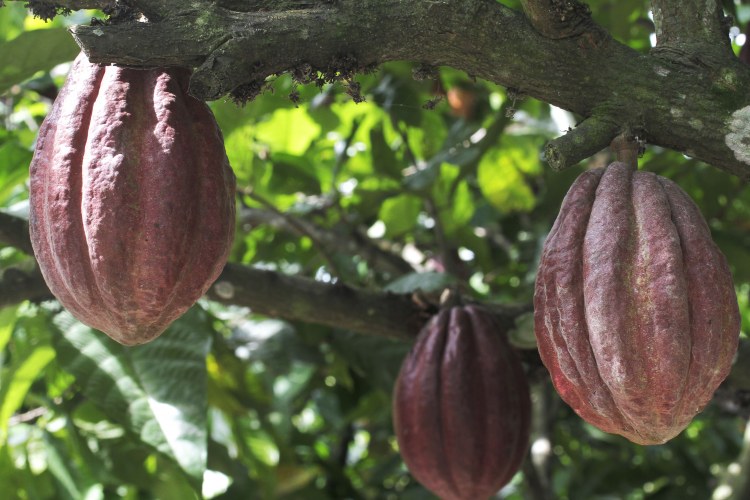Cocoa in Sulawesi, Indonesia
Cocoa in Sulawesi, Indonesia
Globally, chocolate consumption has boomed over the course of the last decade. Consumption in Asia and Latin America is rising rapidly. At present, the European Union and North America represent 60% of the world's chocolate consumption. There is a worldwide need to create a more sustainable form of cocoa production that will boost productivity so that future demand can be met. Small-scale farmers, who are responsible for 90% of global production, are therefore key to this revolution.
Indonesia is the world’s third biggest cocoa producer with 849,875 tons a year, most of which comes from Sulawesi. Sulawesi produces huge amounts of cocoa: South Sulawesi alone produces 70% of Indonesia’s total cocoa production. The majority of the cocoa is produced by small-scale farmers with low productivity due to a lack of knowledge regarding pests and diseases and how to treat them. Poor post-harvest techniques also lead to low quality fermented beans. Farmers have very limited access to credit and farmers’ organisations lack the necessary thrust to transform their cocoa production into a profitable business.

The overwhelming majority of cocoa farmers in Indonesia are not organised so as to be able to collect and sell a consistent quality and volume of their members’ products effectively and efficiently. Most of these farmers do not understand quality, volume and product safety standards. Their weak negotiating position is the result of the inability of the farmers’ organisations to build business relations and negotiate with the private sector. Therefore, only a handful of private companies believe that farmers’ organisations can be professional business partners and are able to provide good quality, sustainable cocoa. Examples are PT Mars and PT Armajaro, which have developed business models involving smallholder farmers such as the Amamah farmers’ organisation in Polewali Mandar and Masagena in North Luwu. These private firms buy certified cocoa beans at premium prices, provide training on product certification according to UTZ standards, facilitate access to credit from financial institutions, and develop inclusive business models with farmers’ organisations.
Challenges
- Low cocoa production at farm level due to ageing plantations, pests and diseases such as cocoa stem borer
- Many farmers use subsidized chemical fertilizer
- Poor quality of fermented beans due to poor post-harvest processing
- Farmers’ organisations lack expertise in cocoa business management
- Farmers have very limited access to financial institutions
Our strategies
- Increase productivity by planting superior varieties which are resistant to pests and diseases
- Organic farming practices such as producing organic fertilizer
- Promote sustainable agricultural practices, such as inoculation techniques and the renewal of ageing plantations to improve cocoa productivity
- Farmer Field Schools to carry out experiments, observation and group analysis. Farmers visit other FOs to exchange knowledge and seek inspiration
- Post-harvesting techniques such as drying
- Set up a system to obtain market information (such as price) on a regular basis
- Training to strengthen the management and organisational capacities of the farmers’ organisations. We coach them in recording their activities and thorough accounting.
- Sustainable contracts with private partners. Set up clonal gardens (field research centres) with Continaf and Mars.
Organic cocoa initiative brought a sweet deal for farmers

There is more to a chocolate bar than meets the eye. A story of chocolate is a story of struggle and hope for cocoa farmers. This is also a story of Mr. Amir & Mrs. Fatimah, cocoa farmers in Luwu Timur District of South Sulawesi Province, where Rikolto and La Galigo Foundation initiated an organic cocoa farming in 2018.
The collaboration also involved Cahaya Sehati Cooperative (CSC), Rikolto’s partner. We turned a 1.5 hectare of land into a demonstration plot where 20 cocoa farmers –including Mr, Amir & Mrs. Fatimah- learnt how to maximise their yields without the use of pesticides.
Total beneficiaries

In 2019, around 4,636 farmers and their families received benefits due to our interventions.
1432 farmers of Amanah Cooperative.
2,248 farmers of Masagena Cooperative.
956 farmers of Cahaya Sehati Cooperative.

Certified farmers
By 2019, all the 4,636 cocoa farmers that benefited from the project have adopted sustainable cocoa farming practices that comply with Rainforest Alliance standards.
Results achieved
- Production has risen to 1.3 tons/ha thanks to regular harvesting, pruning, fertilizing and sanitation (P3S)
- 821 tons of dry beans sold through collective marketing
- Growing number of farmers contributing to the organization, positive annual balance sheets
- Amanah and Cahaya Sehati concluded negotiations with Mars to obtain the Rainforest Alliance certification
- Mars offered the above organisations a premium for their pre-certified beans six months before they obtained certification
- Cooperation contracts between Mars and Amanah, Masagena and Cahaya Sehati
- Amanah, Masagena and Cahaya Sehati hold their own certificates
- Parimo had their cocoa beans accepted by Mars as good quality beans meeting RA standards
- Farmers have additional income sources thanks to cocoa bean snacks and seedlings (Masagena), rice-based snacks (Cahaya Sehati) and corn and ginger as intercrops (Parimo).
- Farmers sell organic pesticide ‘Fertitop’ (goat urine and faeces)
- 3600 farmers received training in sustainable cocoa farming with organic inputs
- 2 clonal gardens and nurseries; the nursery in Pongo produced 100,000 seedlings
- 35 young farmers were trained as cocoa doctors, from cultivation to supporting businesses (seedling nurseries and integrated cocoa/livestock farming)

Long-term results
- Members of the Indonesian Cocoa Sustainable Partnership (government, private sector, NGOs, research institutions, etc.) implementing inclusive business models with Farmers’ Organisations to support the professionalism of FOs
- Mars’s experience should inspire other cocoa-processing companies to make their sourcing policies more inclusive for small-scale farmers:
Facilitate access to micro-finance for local farmers and their sustainable agricultural products, and offer a fair price for cocoa products.
Inform farmers about market requirements (quality, volume, price, form), support them in achieving these requirements and participate in dialogue with other chain actors. - The global Cocoa Trade will be secured thanks to a more sustainable form of production that will be capable of overcoming the challenges of climate change and ensuring a fair price for family farmers.














